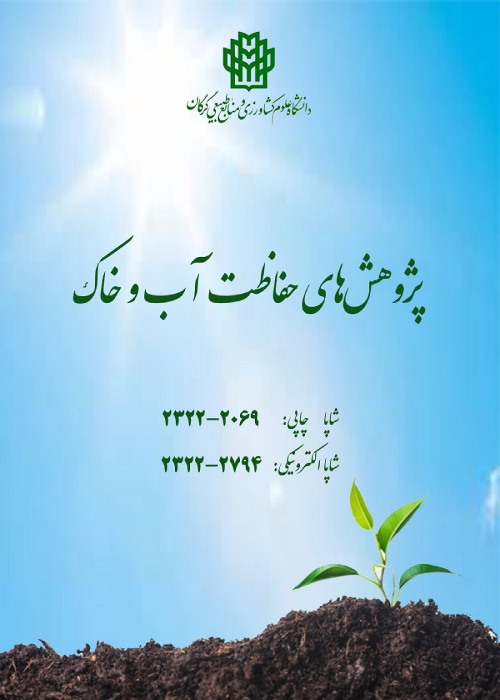Effect of wastewater on transfer heavy metals and chemical compounds in soil column under basil
Author(s):
Abstract:
Background And Objectives
Although using of wastewater in agriculture have advantages, but these waters may be contain pathogenic microorganisms, heavy metals or other harmful organic and inorganic compounds. Therefore this elements can be undesirable environmental impacts such as pollution water sources (especially groundwater), soil and plants. Therefore efforts for obtain proper disposal of wastewater in the environment is essential. Therefore the purpose of this study is investigate the effect of wastewater on transfer of heavy metals and chemical compounds in soil column under basil cultivationMaterials And Methods
This study was conducted based on a completely randomized designed with three treatment watering and triplicates under lysimeter condition. The applied treatments consisted of watering included raw wastewater (W1), treated wastewater (W2) and a composition of 50% raw wastewater and 50% fresh water (W3). For this purpose, 9 cubic (30 cm × 30 cm × 126 cm) metal lysimeters containing a three-layer soil were used. The soil texture from top to bottom of lysimeters were clay, clay loam and 40 cm sandy loam, respectively. After lysimeters preparing, basil was planted in the lysimeter. Pb, Ni, Cu, Zn, Nitrate, phosphate and potassium concentration in leachate were measured after each watering.Results
The results indicate that soil columns (under basil cultivation) ability to keep Pb, Ni, Cu, Zn, Nitrate, phosphate and potassium concentration in wastewater. So Mean values of each of the above mentioned parameters were lower in the leachate compared to the wastewaters entering the lysimeter. Although during the use of wastewater, amounts of Pb, Ni, Cu, Zn, Nitrate, phosphate and potassium concentration in drainage increased but the value of this parameter is below the limits. The results showed the effect of type watering on mean values of all parameters (exception of Pb and Ni) was significantly. In terms of magnitude and significant, pattern of Zn, potassium, nitrate and phosphate were W3 =W2Conclusion
According to the upward trend of heavy metals and nitrates in leachate, special care must be taken in using of wastewater (especially in raw wastewater). Because in future, with decomposition of organic matter, these elements can enter in groundwater and environment and be dangerous to humans Keywords:
Language:
Persian
Published:
Water and Soil Conservation, Volume:23 Issue: 5, 2017
Pages:
1 to 23
magiran.com/p1659946
دانلود و مطالعه متن این مقاله با یکی از روشهای زیر امکان پذیر است:
اشتراک شخصی
با عضویت و پرداخت آنلاین حق اشتراک یکساله به مبلغ 1,390,000ريال میتوانید 70 عنوان مطلب دانلود کنید!
اشتراک سازمانی
به کتابخانه دانشگاه یا محل کار خود پیشنهاد کنید تا اشتراک سازمانی این پایگاه را برای دسترسی نامحدود همه کاربران به متن مطالب تهیه نمایند!
توجه!
- حق عضویت دریافتی صرف حمایت از نشریات عضو و نگهداری، تکمیل و توسعه مگیران میشود.
- پرداخت حق اشتراک و دانلود مقالات اجازه بازنشر آن در سایر رسانههای چاپی و دیجیتال را به کاربر نمیدهد.
دسترسی سراسری کاربران دانشگاه پیام نور!
اعضای هیئت علمی و دانشجویان دانشگاه پیام نور در سراسر کشور، در صورت ثبت نام با ایمیل دانشگاهی، تا پایان فروردین ماه 1403 به مقالات سایت دسترسی خواهند داشت!
In order to view content subscription is required
Personal subscription
Subscribe magiran.com for 70 € euros via PayPal and download 70 articles during a year.
Organization subscription
Please contact us to subscribe your university or library for unlimited access!


